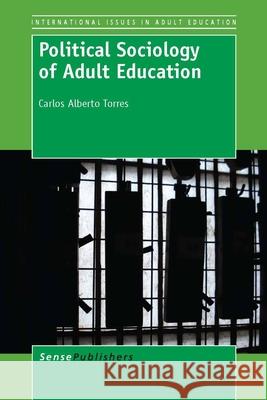Political Sociology of Adult Education » książka
Political Sociology of Adult Education
ISBN-13: 9789462092266 / Angielski / Twarda / 2013 / 116 str.
Political Sociology of Adult Education
ISBN-13: 9789462092266 / Angielski / Twarda / 2013 / 116 str.
(netto: 420,89 VAT: 5%)
Najniższa cena z 30 dni: 425,63
ok. 30 dni roboczych.
Darmowa dostawa!
Critical Theorist Carlos Alberto Torres offers a political sociology of adult learning and education, based on Critical Social Theory and the always inspiring work of Paulo Freire. Empirically grounded and theoretically sophisticated, this new book follows the footsteps of his classic book published in the early nineties The Politics of Nonformal Education in Latin America. Torres book offers comparative and international sociological analyses of adult learning and education, an area in which there is an obsession with 'practice' and an aversion to theory, with some notable and laudable exceptions, but which has the potential to provide avenues for social justice education in ways that no other systems and policies can. This book revitalizes social theory in education, and provides ample evidence of the power of adult learning and education, examining a variety of policy documents connected with the various adult education congresses promoted by the UNESCO, which are thoroughly scrutinized for what they bring to or omit from the policy agenda. In the context of new developments in adult learning and education, particularly the impact of multiple globalizations, neoliberalism, and the new role of international organizations in reconceptualizing lifelong learning, new evidence-based research, new narratives, and the vibrancy of social movements striving for a new and possible world, it is clear that new theoretical designs were needed making this is a must-read book.
Critical Theorist Carlos Alberto Torres offers a political sociology of adult learning and education, based on Critical Social Theory and the always inspiring work of Paulo Freire. Empirically grounded and theoretically sophisticated, this new book follows the footsteps of his classic book published in the early nineties The Politics of Nonformal Education in Latin America. Torres book offers comparative and international sociological analyses of adult learning and education, an area in which there is an obsession with practice and an aversion to theory, with some notable and laudable exceptions, but which has the potential to provide avenues for social justice education in ways that no other systems and policies can. This book revitalizes social theory in education, and provides ample evidence of the power of adult learning and education, examining a variety of policy documents connected with the various adult education congresses promoted by the UNESCO, which are thoroughly scrutinized for what they bring to or omit from the policy agenda. In the context of new developments in adult learning and education, particularly the impact of multiple globalizations, neoliberalism, and the new role of international organizations in reconceptualizing lifelong learning, new evidence-based research, new narratives, and the vibrancy of social movements striving for a new and possible world, it is clear that new theoretical designs were needed making this is a must-read book.











